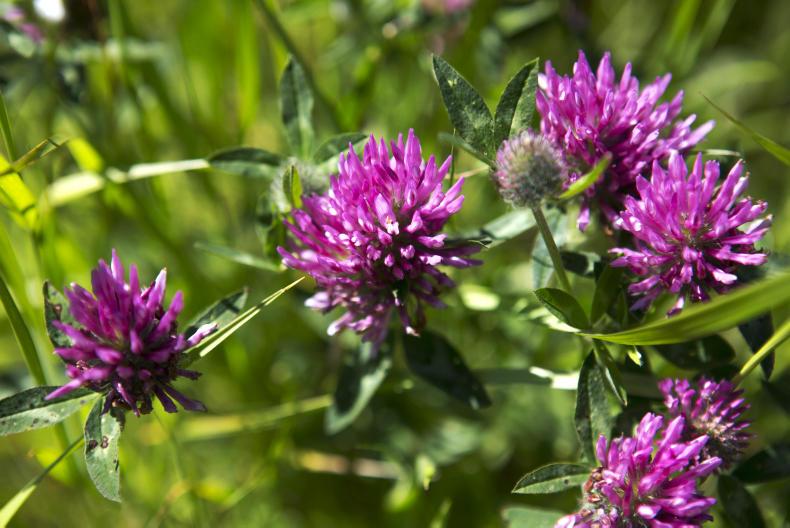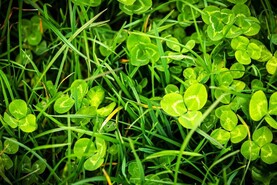Home-grown clover can replace imported soya as a source of protein in animal feed, according to Danish research carried out by Aarhus University.
Europe is heavily reliant on imported soya, particularly from the US, but given the growing consumer interest in non-GM food and milk, an argument has to be made for the use of locally produced protein.
These points were put across in a presentation by Erik Fog, the senior organic farming adviser with Seges, the Danish innovation centre for agriculture, at the biannual Agromek conference in Denmark.
In Ireland where you have so much grass it’s an obvious thing to do
Speaking to the Irish Farmers Journal, Fog said: “If you want to reduce the dependency on organic protein, it’s an obvious possibility that you can extract the protein from the grass.
“I think in Ireland where you have so much grass it’s an obvious thing to do.”
Latest figures for EU plant protein demand show 27m tonnes is required each year of which almost two-thirds is imported.
Carbon emissions
As plans for the next Common Agricultural Policy (CAP) continue to be developed, Fog also pointed to research conducted in Denmark that showed that growing more clover could cut carbon emissions.
The report suggested that if 25% of the land was converted to grass for protein production, Denmark could meet climate targets, partly by providing additional carbon sequestration from the soil.
Listen to "Replacing soya with clover" on Spreaker.
As a protein crop, clover was chosen over other traditional sources of protein, such as peas and alfalfa, because tests showed that the protein levels from clover were higher.
“Compared to peas we have a much higher production per hectare,” Fog said.
Aarhus University has been conducting a number of studies on the use of clover in animal feed, including a study on dairy cows where traditional grass silage was replaced with clover silage.
Dairy cows
“The cows performed very well and actually gave more milk with this [clover] silage,” Fog said. “Up to 2kg/cow/day more milk. It was quite a remarkably positive result.”
The university has also carried out tests on poultry and found that more omega 3 is apparent in poultry fed with clover protein, while trial results from pigs fed on a clover protein mix are due out in March.
Read more
Non-GM and organic identified as key EU plant protein growth areas
New veggie ‘steak’ hits Tesco Ireland shelves
Home-grown clover can replace imported soya as a source of protein in animal feed, according to Danish research carried out by Aarhus University.
Europe is heavily reliant on imported soya, particularly from the US, but given the growing consumer interest in non-GM food and milk, an argument has to be made for the use of locally produced protein.
These points were put across in a presentation by Erik Fog, the senior organic farming adviser with Seges, the Danish innovation centre for agriculture, at the biannual Agromek conference in Denmark.
In Ireland where you have so much grass it’s an obvious thing to do
Speaking to the Irish Farmers Journal, Fog said: “If you want to reduce the dependency on organic protein, it’s an obvious possibility that you can extract the protein from the grass.
“I think in Ireland where you have so much grass it’s an obvious thing to do.”
Latest figures for EU plant protein demand show 27m tonnes is required each year of which almost two-thirds is imported.
Carbon emissions
As plans for the next Common Agricultural Policy (CAP) continue to be developed, Fog also pointed to research conducted in Denmark that showed that growing more clover could cut carbon emissions.
The report suggested that if 25% of the land was converted to grass for protein production, Denmark could meet climate targets, partly by providing additional carbon sequestration from the soil.
Listen to "Replacing soya with clover" on Spreaker.
As a protein crop, clover was chosen over other traditional sources of protein, such as peas and alfalfa, because tests showed that the protein levels from clover were higher.
“Compared to peas we have a much higher production per hectare,” Fog said.
Aarhus University has been conducting a number of studies on the use of clover in animal feed, including a study on dairy cows where traditional grass silage was replaced with clover silage.
Dairy cows
“The cows performed very well and actually gave more milk with this [clover] silage,” Fog said. “Up to 2kg/cow/day more milk. It was quite a remarkably positive result.”
The university has also carried out tests on poultry and found that more omega 3 is apparent in poultry fed with clover protein, while trial results from pigs fed on a clover protein mix are due out in March.
Read more
Non-GM and organic identified as key EU plant protein growth areas
New veggie ‘steak’ hits Tesco Ireland shelves






 This is a subscriber-only article
This is a subscriber-only article










SHARING OPTIONS: